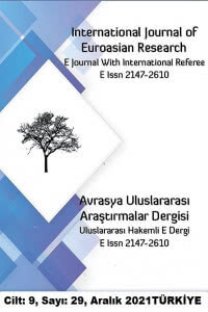TEKNOLOJİK GELİŞMELER ÇERÇEVESİNDE DEĞİŞEN GÜÇ ALGISI, GÜVENLİK KÜLTÜRÜ KAVRAMI VE ULUS DEVLETİN GÜVENLİK İNŞASI
CHANGING POWER PERCEPTION, SECURITY IN THE FRAMEWORK OF TECHNOLOGICAL DEVELOPMENTS CULTURE CONCEPT AND SECURITY BUILDING OF THE NATIONAL STATE
___
- BİLGİN, Pınar, (2015), “Güvenlikten İçeri Uluslararası: Türkiye’de Güvenlik ve Laiklik”, Marmara Avrupa Araştırmaları Dergisi, C. XXIII, S. 2: s. 123-142.
- BİLGİN, Pınar, (2003), “Individual and Societal Dimension of Security”, International Studies Review, S. 5: s. 203-222.
- BİLGİN, Pınar, (2017), “Inquiring into Others’ Conceptions of the International andSecurity”, American Political Science Association, V. 50, Issue 3: s. 652-655.
- BOOTH, Ken, (1991), “Security and Emancipation”, Review of International Studies, V. 17, N. 4: s. 313-326.
- BOOTH, Ken, (2007), Theory of World Security, Cambridge Studies in International Relations:105, Cambridge: Cambridge University Press,
- CALLEO, David, (2009), Follies of Power, America’s Unipolar Fantasy, Cambridge: Cambridge University Press.
- CARROLL, Peter, (2007), “Security Culture: A Personal Perspective from United Kingdom”, Nuclear Security Culture: From National Best Practices to International Standards, (Ed. I. Khripunov- N. Ischenko- J. Holmes), Nato Science for Peace and Security Series E: Human and Societal Dynamics, 23-31.
- GARİUP, Monica, (2009), European Security Culture: Langue, Theory and Policy, Farnham: Ashgate Publishing Limited.
- KESZTHELYI, Andras, (2015), “Age of Cyber Crime and Culture of Security”, Science Journal of Business and Management. Special Issue: The Role of Knowledge and Management’s Tasks in the Companies, V. 3, No. 1-1: s. 39-45.
- KHRIPUNOV, Igor, Ischenko, Nikolay and Holmes, James R. (Ed.) (2007), Nuclear Security Culture: From National Best Practices to International Standards, NATO Science for Peace and Security Series E: Human and Societal Dynamics.
- KRAUSE, Keith, (1999), “Cross-Cultural Dimensions of Multilateral Non-Proliferation and Arms Control Dialogues: An Overview”, Culture and Security: Multilateralism, Arms Control and Security Building, (Ed. K. Krause), London: Psychology Press.
- MORGENTHAU, Hans, (1948), Politics Among Nations: The Struggle for Power and Peace, New York: Alfred A. Knopf.
- MITROPOLITSKI, Simeon, (2011), “Weber’s Definition of the State as an Ethnographic Tool for Understanding the Contemporary Political Science State of the Discipline”, Canadian Political Science Association.
- NAIM, Moises, (2013), The End of Power: From Boardrooms to Battlefields and Churches to States, Why Being in Charge isn’t What It Used to Be, New York: Basic Books.
- NYE, Joseph S., (2007), The Powers to Lead, Oxford: Oxford University Press.
- ROER, Kai, (2015), Building a Security Culture, Cambridgeshire: IT Governance Publishing.
- ROSENAU, James N., (1990), Turbulence in Wolrd Politics: A Theory of Change and Continuity, New Jersey: Princeton University Press.
- WAEVER, Ole, (1998), “Securitization and Desecuritization”, On Security, (Ed. R. D. Lipschutz), New York: Columbia University Press, 39-69.
- YURDUSEV, Nuri A., (2003), International Relations and Philosophy of History: A Civilizational Approach, New York: Palgrave McMillan.
- ISSN: 2147-2610
- Yayın Aralığı: 4
- Başlangıç: 2012
- Yayıncı: Kürşat Öncül
TÜRKÇE GENEL SÖZLÜKLERDE TANIMLAMA SORUNU: SÜT ANA MADDESİ
SOSYAL BİLGİLER ÖĞRETMEN ADAYLARININ GÜNCEL OLAYLARI ARGÜMANTASYON TEKNİĞİ İLE DEĞERLENDİRMELERİ
Mehmet AKKAN, Nadire Emel AKHAN
Turan KOCABIYIK, Esra AKSOY, Türker TEKER
BAMSI BEYREK BOYUNUN TRABZON VARYANTI BASI BÖYREK ÜZERİNE BİR İNCELEME
CUSUP MAMAY'IN TOLTOY DESTANI’NDA ETNİK YAPI
DEĞİŞEN GÜÇ ALGISI EKSENİNDE GÜVENLİK KÜLTÜRÜ KAVRAMI VE ULUS DEVLETİN GÜVENLİK İNŞASI
